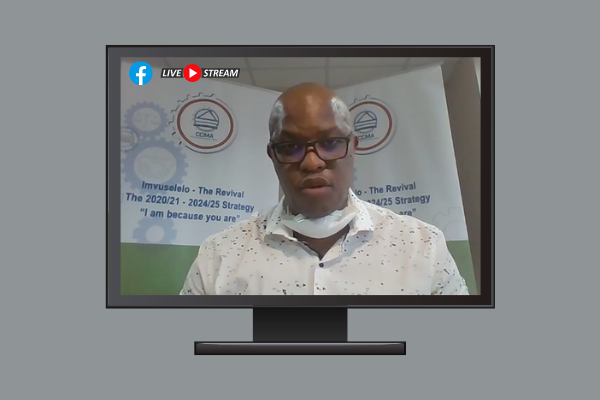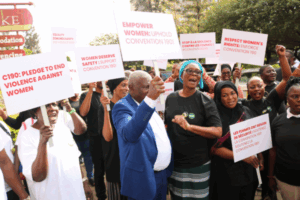The Director of CCMA, Cameron Sello Morajane, hosted a Q&A session on Facebook Live to address the impact of the covid-19 pandemic on the labour market in South Africa. Morajane also provided an update on the CCMA operations during the lockdown.
View the Facebook Livestream here
Read the full transcript of the address here
Below we’ve summarised Morajane’s responses to the questions asked by viewers during the broadcast. Before we dive in, kindly note the following:
- The 24 offices of the CCMA will open to the public on 18 May 2020
- The CCMA call centre is now decentralised. Get the contact number for your province here
- Additional venues for hearings have been secured, including other State facilities
- Web-based hearings have commenced. Mojarane specifically mentioned Zoom and Microsoft Teams
- All matters that can be dispensed through the filing of papers will be dealt with in this way to stop unnecessary travel and exposure of people to the coronavirus. Here’s the comprehensive directive by the CCMA
- This week (11-15th) is a preparatory/trial week for the CCMA and walk-ins are discouraged
- Parties must remain alert for phone calls from CCMA concerning conciliation and con-arbs cases, and engage in a meaningful way with the commissioners
____________
When will the CCMA offices reopen?
The CCMA offices will open on 18 May 2020. This week the CCMA will complete implementing the recommended guidelines for coronavirus workplace preparedness. All the offices will be disinfected. PPEs (sanitisers, gloves and masks) have been secured. The floor markings for social distancing have been installed. Read the directive on accessing the CCMA during the covid-19 lockdown
Morajane: “We have declared that preservation of life is paramount. We will take the temperature of users and staff members at our offices and provide sanitisers. You will not be allowed to remain or enter our offices without a mask. We will disinfect our offices after every hearing.”
Do I require a permit to travel to the CCMA?
You do not require a permit to travel to a CCMA office at this stage. There are exceptions – practitioners such as attorneys must have travel permits issued by the heads of their organisations.
Morajane: “The Department of Public Service and Administration has advised public entities to continue delivering services. The CCMA is a public entity and we will continue to operate, albeit limitedly. Any member of the public that experiences difficulty or is prevented from visiting CCMA offices and the bargaining councils should alert us accordingly.”
Will cases be heard at plant level?
Yes. Parties can hold hearings at workplaces, particularly matters related to section 108 (A) or unfair dismissal. CCMA will deploy commissioners to workplaces to hear matters, but the Occupational Health Safety (OHS) measures and coronavirus-free environment must be in place.
When are web-based hearings going to start?
Web-based hearings are already happening. All are welcome to use the online services, but both parties must provide a consent form to this effect. The CCMA will advise on video conferencing platforms and setting of uncapped and stable WiFi.
Morajane: “Web-based hearings are consent-based for now. Please note that any interruptions due to connectivity issues will compromise the hearing and cause postponement and delays.”
What happens when a party refuses to consent to a web-based hearing?
Web-based hearings are not compulsory at this stage. The CCMA will not conduct hearings via online platforms without the consent of both parties.
Morajane: “I cannot say for certain if this approach will be mandatory in the future within the context of the Fourth Industrial Revolution. Remember in terms of Section 138, the commissioner has the power on how the matter should be determined.”
Will the credibility of the witnesses be affected?
The CCMA has developed specific guidelines for conducting web-based hearings to maintain the character and content of hearings. The use of both video and audio is recommended and can assist users to determine the credibility of witnesses. Video conferencing can deplete data rapidly, and the CCMA has committed to allowing audio only hearings in some instances.
Morajane: “I urge employers, unions and the government to provide efficient and sufficient tools to enable the web-based approach to work effectively. Our success depends on access to strong, uncapped WiFi or data of 4G or 5G. I am glad that the labour court has also introduced the web-based approach. This effectively means the character of evidence that we deal with moving forward isn’t just the documented transcript, but a video recording that can be stored on the cloud.”
Is the web-based approach going to be the norm going forward?
Yes. The CCMA will continue to use online-based services going forward, especially in the context of the Fourth Industrial Revolution.
Morajane: “We accept this fully and without hesitation and are going to ensure that we maintain the new approaches because there are benefits to it. We strongly believe that as an entity of government that is operating from a budget allocated from the fiscus that all State facilities should be accessible to the CCMA to be used for hearings. Unfortunately, the online processes and alternative venues for hearings are forced upon us by the covid-19 pandemic. This is what we ought to have done ordinarily.”
Will priority be given to matters that were referred during the lockdown in March?
The CCMA will not prioritise matters that were filed during the covid-19 lockdown. All matters that were referred before the lockdown will be handled first. The CCMA will reschedule hearings this month.
Morajane: “Please don’t panic if you receive a note that says ‘case cancelled’. Matters are being rescheduled, and not cancelled. Matters have not been removed from the roll. There are no special applications that must be made for these matters to proceed. Hearings will be in progress by the end of May.”
How do we deal with Rule 25 and section 189(A) after lockdown?
The process of Rule 25, which concerns applications for legal representation, still applies. All applications that can be dispensed purely on paper can be submitted, preferably through electronic means.
Morajane: “Section 189(A) – the process of requesting facilitation for retrenchments has not changed. There are two Covid-19 Temporary Employee/Employer Relief Schemes (TERS). Be specific when you apply. I can share with you with pleasure that we have had web-based facilitation of 189(A) processes, including the matter of the SAA.”
Will CCMA accept delayed applications of condonations?
The CCMA recognises that lockdown measures will affect the ability of many people to submit applications for condonations. Thus, delayed applications of condonations due to covid-19 measures will be accepted. But, parties are advised against fraudulent misrepresentation.
Morajane: “Note that in the Disaster Management Act, together with the regulations issued in terms of it, there’s no provision suspending the application of other laws. We operate on the principle of conflict resolution. Therefore, the LRA and the rules issued in terms of that continues to apply.”
What about bargaining councils?
Bargaining councils have constitutions, collective agreements and other processes that are recognised by the CCMA.
The CCMA will synchronise the new measures and approaches with bargaining councils to ensure users enjoy the same benefits.
Morojane: “Do not panic about the bargaining councils. I have seen public service bargaining councils such as the PSCBC talking about web-based hearings and things like that. We are going to make sure that we are consistent.”
How about distressed companies that can’t afford to pay salaries?
The rights of workers are particularly threatened during the covid-19 pandemic. The CCMA is aware of the issues, which include forced leave, non-payment of salaries and unfair dismissals.
Employers should approach the Department of Labour urgently online and apply for TERS funding from the R500bn covid-19 kitty. Apply for your employees, too.
More than 100,000 payments to companies have been disbursed through the Covid-19 Temporary Employee/Employer Relief Scheme. Find the list of companies that have received the covid-19 TERS funding here.
Morajane: “Unemployment poses a direct assault to dignity. I am appealing to employers to comply with our laws when notifying workers about salary issues and retrenchments. It is not a dignified approach to send a WhatsApp two days before payday to say that you can’t pay an employee their salary, or sending an email to announce retrenchments in a week’s time. I am asking that we exercise ubuntu. Our Constitution expects it of us.
Can an employer terminate fixed contracts before the actual expiration?
Morajane: “Sanctity of contracts applies. Any premature termination of a contract is a dismissal and a matter that is justifiable at the CCMA. Whether such a dismissal is fair or not depends on the facts that you are going to present to the commissioner.
Premature termination of a contract is referred to in Section 186, read together with Section 108(B). I know that some take a lawful approach and call it unlawful termination of a contract and claim damages. I don’t recommend it to be done at the labour court because it is a long and more expensive process.”
Can an employer impose leave on an employee?
Section 20 sub-section 10 paragraph (b) of the BCEA states that in the absence of an agreement an employer can direct on when an employee must take leave. Leave is a statutory requirement, a rights issue.
Issues involving pay reduction, no pay and no work, and no payment can be referred to the CCMA.
Regarding remote working, unions and companies should develop guidelines before implementing.
Morajane: “Workers are being forced to take leave because companies want to maintain a beautiful balance sheet.
“There is a contradiction when a worker complies with advice from WHO or our Department of Health to self-quarantine but then does not get paid.
“We must always use approaches that are transparent, consultative and constitutionally correct.”
Can employees be forced to indemnify the employer against employment laws?
You can’t give away your employment rights because they are statutory. But, there are processes in terms of Section 40 of the OHS Act where the minister can exempt the employers from complying with certain provisions or all the provisions of the OHS Act.
Morajane: “This is a technical question, and I don’t have a yes or no answer. We recommend you consider in totality all the factors. But it can’t be done by force without following the exemption processes that are prescribed in the OHS Act. Workers cannot, in terms of the LRA and BCEA, be made as a condition of employment to give up their employment law rights.”
The Ideal CCMA Commissioner
Must be caring – The CCMA is committed to developing a more caring commissioner as South Africa faces the coronavirus pandemic. Commissioners must act with dignity at all times.
Must be willing to travel to workplaces – CCMA commissioners are expected to travel often to parties to resolve disputes, particularly the matters under Section 108(A)
Must be tech-savvy and knowledgeable – CCMA commissioners are expected to be competent online to ensure expedite resolution of disputes and less costly and stressful processes. They must keep abreast with the happenings in the labour market and develop expertise in case laws and statutes.







